Australia’s Special Forces will be re-tasked for missions to counter China’s push into the Pacific
Australia’s Special Forces will be re-tasked for missions to counter foreign state threats including China’s push into the Pacific.
World
Don't miss out on the headlines from World. Followed categories will be added to My News.
Exclusive: Australia’s Special Forces will be re-tasked for missions to counter foreign state threats including China’s push into the Pacific, in an urgent back-to-basics drive to an “unconventional warfare” footing.
And in the overhaul, the Defence Minister or Prime Minister could assume a more warlike hands-on role as “supreme commander” of the military in what would be the most significant military-civilian power shift in controlling the ranks in 75 years.
The reforms up-end decades of old military role thinking with our elite troops elevated to covert missions working both domestically alongside spy agency the Australian Security Intelligence Organisation (ASIO) on “counter state operations” and its overseas counterpart the Australian Secret Intelligence Service (ASIS) in “grey zone hybrid war” activity.
This includes the need to out foreign spies attempting to set up interference operations in Australia including stealing national secrets, as well as mapping our critical infrastructure.
The overhaul will also see our special forces fan out across the Pacific to work with the armed forces of our allied island nations — including Samoa, Fiji, Tonga, the Solomon Islands, Papua New Guinea and Tahiti — and work on what Defence has stamped as an urgent requirement for a return to the basics.
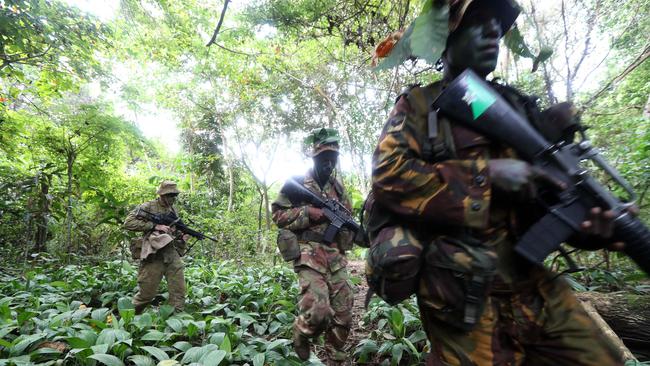
They have been told to get out of the Middle East “sand pit mentality” and work on new ways of operating.
With challenges from China’s military expansionism in the Pacific region, it has now been concluded Special Forces had to urgently pivot to counter state operations both in Australia and immediate region.
Modern warfare and technology including drones and automated sensors will render large-scale Special Forces air or sea insertions impossible without detection prompting the need for a new approach.
This has to include intimately studying first-hand the geography of our region and reaffirming relationships with the military of Pacific island nations, which Defence has concluded China was attempting to sever through a campaign of misinformation.
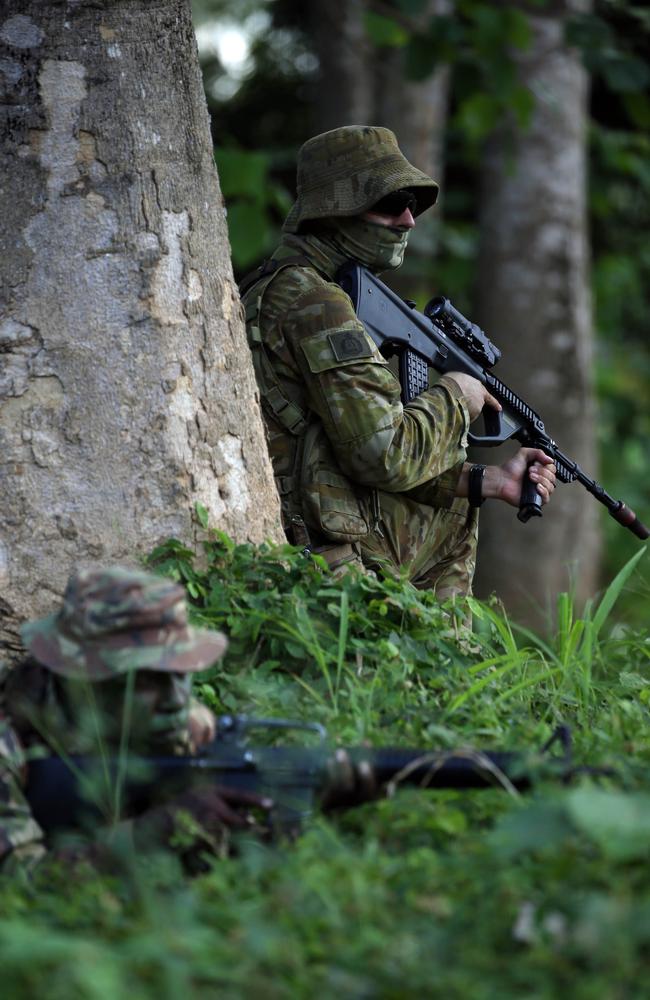
The re-purposing of our most elite soldiers comes in the wake of the reputationally devastating Brereton Report into war crimes in Afghanistan and a wide-ranging internal review of our armed forces.
It can be revealed a Defence review of our 20-year engagement in Afghanistan found deployments had achieved significant success in meeting coalition objectives, but the ADF’s military “overmatch” against the Taliban and terrorist factions in the Middle East – with greater firepower, training, surveillance and airlift capabilities – had made our elite soldiers “too conventional”.
There has been some disquiet about the handling of the Brereton Report by military chiefs and it has been mooted that the Prime Minister, Cabinet and Defence Minister of the day exercise greater control Under the Defence Act 1903, allowing them to assume “supreme commander” of the ADF role.
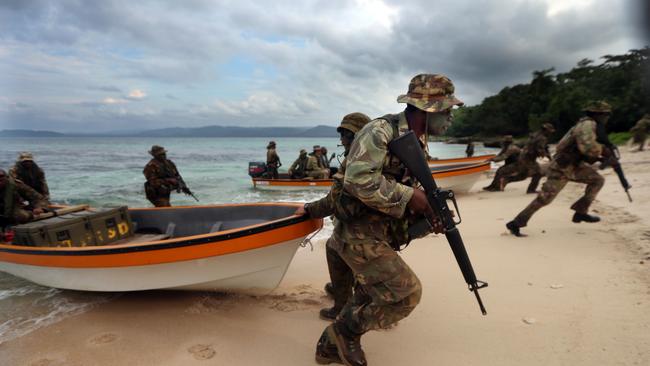
It is a move that has not been required post World War 2.
Assistant Defence Minister Andrew Hastie would not discuss the full extent of the changes for operational reasons nor the potential for greater political oversight of the armed forces, but confirmed challenges in the region and the Brereton Report had predicated a “big strategic rethink”.
“We can’t afford to be looking in the rear view mirror and moping around the place and it’s so important we get things going,” Mr Hastie said.
“I think the overall impact of doing a long extended campaign in Afghanistan, operating out of a forward base with all the superiority in military terms we became conventional again and we need to get back to our roots – and that is unconventional thinking, solving the toughest problems.
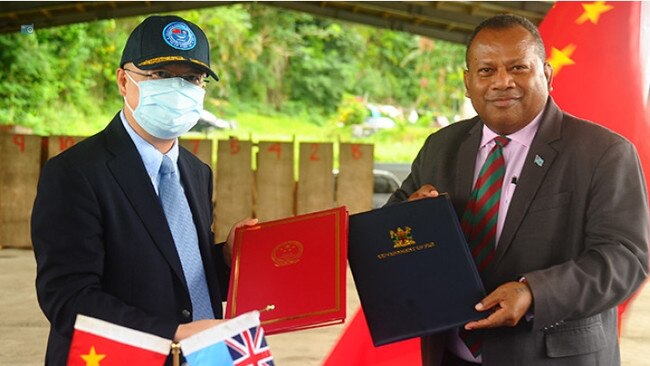
“Getting back to basics is critical, sound ethical leadership, really good training, trust and you avoid many of the issues that Brereton Report report identified.”
He said foreign interference such as attempted assassination of Russian defector Sergei Skripal in 2018 in Salisbury in England could happen here and Special Forces involved in counter state operations made sense.
“It is entirely possible,” he said.
“The Brits I mean they’ve had assassination attempts on their home soil from the Russians, so they are focused on counter state operations.
“You can’t rule these things out and we’ve had terrorist attacks on our soil why wouldn’t we have espionage or foreign interference or sabotage on our soil? As successive directors general of ASIO have said espionage and foreign interference is being conducted at unprecedented levels far exceeding that of the Cold War. If that is true, then Special Operations Command need to get out of the sand pit, need to get out of this Afghan mindset and start looking at the future, which is counter state operations in our region.”
WHERE MILITARY SHIFT IS COMING FROM
As newly ranked Defence Minister Peter Dutton and his assistant Minister Andrew Hastie looked to the future of the armed forces, there were three texts on their considerable must-read list.
One was where the ADF had been, the other was where they could go – and the third is sending shudders down the spines of the ADF and Defence Department’s high command but is contributing to the thinking around the biggest overhaul of our armed forces.
The first is historical and outlined events around Operation Jaywick where in September 1943, 14 commandos and sailors attached to Z Force in the Krait fishing boat raided Japanese warships in Singapore Harbour sinking six.
This is where the ministers and military want the Special Forces to return – a raw, unplugged back-to-basics covert mission with minimal support should it have gone pear-shaped.
The second is called Sharpening the Dagger by revered 190-year-old British defence and security think tank the Royal United Services Institute detailing how best to optimise forces in the 21st Century, which is contributing to the current overhaul of the British Special Forces.
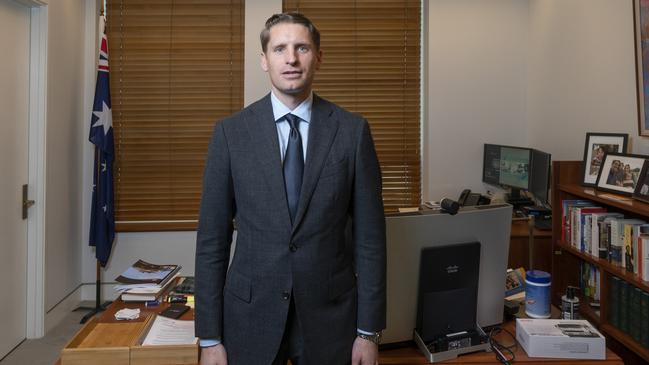
The last is almost two decades old – “Supreme Command – Soldiers, Statesmen, and Leadership in Wartime” by former US State Department counsellor and dean of the John Hopkins School of Advanced International Studies Eliot A. Cohen.
The tome is effectively a blue print for how wars are won when Western politicians declare and define a military’s objectives then step to one side, allowing the military to carry out the brief.
He offers “compelling proof” war was too important to leave to generals instead it was up to active statesmen (or women) to “prod, provoke and even defy” the top brass and cited examples in leadership of Churchill, Israeli David Ben-Gurion and World War 1 French prime minister Georges Clemenceau.
“I have read them and so have others here in Canberra,” was all Mr Hastie would say of the last thesis, which if adopted – and it can under the current constitution and Defence Act – would shift civilian-military relations, leaving the tough calls to politicians and the military to carry out the orders.
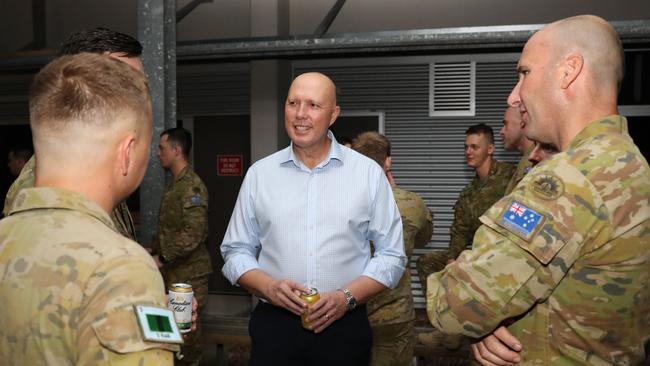
Already in one of his first moves as Defence Minster, Mr Dutton overruled ADF Chief General Angus Campbell’s move to strip citations to Special Forces who served in Afghanistan, as recommended by the Brereton Report.
In doing, it was Mr Dutton who began the morale healing within the ADF.
As a former Special Forces soldier, Mr Hastie said he knew he was accountable to those who sent him to fight and now as a politician knew it was important to have political leadership to reinforce the importance of service and sacrifice and wearing the Aussie flag patch on the shoulder.
“You can’t be a passive Minister that’s why Peter Dutton is a great Minister and someone I am very happy to work with on some of these problems and I feel I’m uniquely positioned with my previous experience to help him understand the issues and ask those tough questions,” Mr Hastie said.


